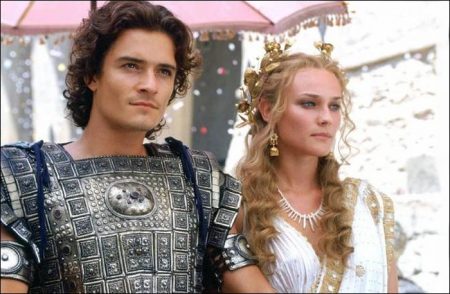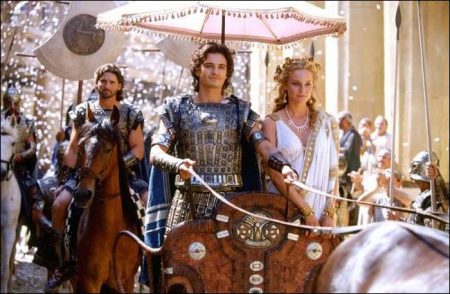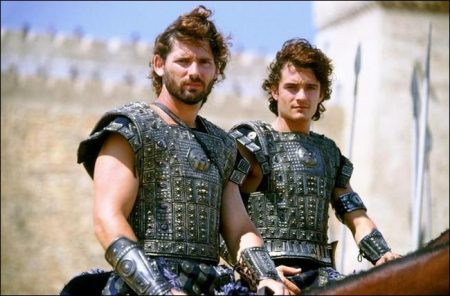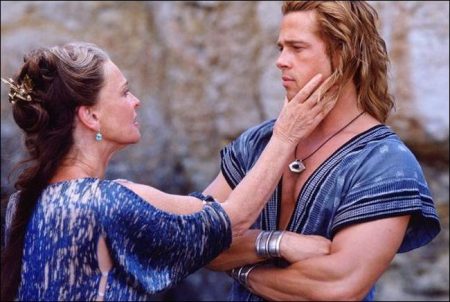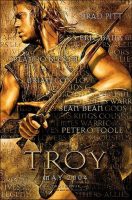Tagline: Throughout time, men have waged war. Some for power, some for glory, some for honor – and some for love.
Troy movie storyline. In ancient Greece, the passion of two of literature’s most notorious lovers, Paris, Prince of Troy (Orlando Bloom) and Helen (Diane Kruger), Queen of Sparta, ignites a war that will devastate a civilization. When Paris spirits Helen away from her husband, King Menelaus (Brendan Gleeson), it is an insult that cannot be suffered.
Familial pride dictates that an affront to Menelaus is an affront to his brother Agamemnon (Brian Cox), powerful King of the Mycenaeans, who soon unites all the massive tribes of Greece to steal Helen back from Troy in defense of his brother’s honor. In truth, Agamemnon’s pursuit of honor is corrupted by his overwhelming greed – he needs to conquer Troy to seize control of the Aegean, thus ensuring the supremacy of his already vast empire.
The walled city, under the leadership of King Priam (Peter O’Toole) and defended by mighty Prince Hector (Eric Bana), is a citadel that no army has ever been able to breach. One man alone stands as the key to victory or defeat over Troy – Achilles (Brad Pitt), believed to be the greatest warrior alive.
Arrogant, rebellious and seemingly invincible, Achilles has allegiance to nothing and no one, save his own glory. It is his insatiable hunger for eternal renown that leads him to attack the gates of Troy under Agamemnon’s banner – but it will be love that ultimately decides his fate. Two worlds will go to war for honor and power. Thousands will fall in pursuit of glory. And for love, a nation will burn to the ground.
Troy is a 2004 American epic period war film written by David Benioff and directed by Wolfgang Petersen. The film features an ensemble cast led by Brad Pitt, Eric Bana, and Orlando Bloom. It is loosely based[2] on Homer’s Iliad in its narration of the entire story of the decade-long Trojan War – condensed into little more than a couple of weeks – rather than just the quarrel between Achilles and Agamemnon in the ninth year. Achilles leads his Myrmidons along with the rest of the Greek army invading the historical city of Troy, defended by Hector’s Trojan army. The end of the film (the sack of Troy) is not taken from the Iliad, but rather from Virgil’s Aeneid as the Iliad concludes with Hector’s death and funeral.
About the Story
Passion is at the heart of all the momentous events driving Troy, an epic chronicle of the triumphs and tragedy of the legendary Trojan War. The seeds of war are sown when King Menelaus of Sparta hosts a banquet to make peace with King Priam of Troy, represented by his eldest son, Prince Hector, defender of Troy. While the two leaders celebrate an end to countless devastating years of war, Hector’s preternaturally handsome brother Paris disappears – only to reappear in the bedchamber of Menelaus’ wife Helen, known far and wide as one of the world’s greatest beauties. When Paris spirits Helen away from Menelaus’ palace without Hector’s knowledge, their fate is sealed: the leaders of countless Greek tribes will unite to wage war against the Trojans.
Among the gathering forces is Achilles, a warrior of such skill and fame that his name alone invokes cold dread in his opponents. It is rumored that his mother Thetis (Julie Christie) is a goddess, and that he shares her power of immortality. But in truth he is only a man, and so must capture eternal life the only way a mortal can: by ensuring that history will forever remember his name.
Achilles’ rapidly growing legend compels Agamemnon, the arrogantly ambitious King of the Greeks and brother to Menelaus, to reluctantly summon him for battle against the Trojans. Although he knows that Agamemnon does nothing except for his own personal gain, Achilles’ insatiable lust for glory and eternal renown leads the warrior far from home and into the front lines of a war waged to seize power and exact vengeance for others.
Hector and Paris arrive in Troy just ahead of the encroaching Greek armada. Their father, King Priam, must decide whether to press war with the Greeks or return Menelaus’ stolen bride and consequently deliver Paris to certain execution, as the young prince would surely follow his love. The choice is soon made clear: Paris will not surrender Helen and Priam will not sacrifice his son. War is the only way.
And war is soon upon them. A thousand Greek warships land upon the Trojan shore, and with Achilles’ god-like abilities driving the attack, not even the leadership of the mighty Hector can keep the Greeks from swiftly taking the beach.
By sunset, the ground is soaked with the blood of Greeks and Trojans alike. Helen is brokenhearted that the cost of her happiness is the death and destruction of so many on both sides of the conflict, but she is powerless to stop it. Paris’ love sustains her, but he too is stricken at the battle he has caused – the Greeks seem destined to take the city.
Destiny, however, is less certain than the Trojans know. All is not well between Agamemnon and his prized warrior Achilles, who makes no secret of his contempt for the King. The warrior fights for no one but himself – until he finds a defiant, terrified girl in his tent, intended as his prize for laying waste to the Temple of Apollo, patron god and protector of Troy. She is Hector’s cousin Briseis (Rose Byrne), a beautiful acolyte of the Temple and seemingly the only person alive who isn’t awed by Achilles’ power. Intrigued, he takes her under his protection instead.
He soon learns the price of such devotion. Achilles finds that he cannot protect Briseis from the whims of an angry, jealous king who longs to punish him for his scorn. When Agamemnon abducts Briseis, an enraged Achilles refuses to raise his sword again in the name of the malevolent King. Without Achilles to tip the scales of fortune towards the Greeks, the Trojans prove to be a much more formidable foe, and the bloody standoff that ensues ultimately wreaks terrible destruction on both of their nations.
“There is an old saying that war brings out the worst and the best in human beings,” muses acclaimed producer/director Wolfgang Petersen. “But war is a disaster for everyone involved. While our film shows the spectacle of battle between tens of thousands of soldiers in a way that audiences have never seen before, the focus of our story is the timeless human aspect of the victories and defeats that Homer recorded.”
Troy is inspired by The Iliad, the epic work attributed to the ancient poet Homer, considered to be the Western world’s original literary master. The epic poems Homer is credited with appear to have been composed in the 8th Century BC, 300-400 years after the supposed fall of Troy. While it isn’t clear whether Homer recited existing oral chronicles or was the sole and original creator, his work has survived the centuries to become literature’s most compelling glimpse into the past.
“I don’t think that any writer in the last 3,000 years has more graphically and accurately described the horrors of war than Homer,” says Petersen. “But in his epic works, the human drama was overshadowed by the brutality. A contemporary audience needs to come into the story through the lives and passions of the real people caught up in this terrifying experience.”
The film’s screenplay is written by David Benioff, author of both screenplay and novel for Spike Lee’s critically acclaimed film 25th Hour. “This is one of those universal stories,” says producer Diana Rathbun. “Not everyone is going to be a great hero and go off and slay the dragon, but the emotions that drive them are something that we have all experienced at some point in our lives.
When I read this script I fell in love with it – the insightful portrayal of the characters makes them immediately recognizable to an audience. It’s very hard sometimes to relate to classic literature as it feels distant, of a different time, a different world, but there’s something about this story that is so easy to connect with, it’s about emotions – whether they were experienced thousands of years ago, or today.”
Troy (2004)
Directed by: Wolfgang Petersen
Starring: Brad Pitt, Eric Bana, Orlando Bloom, Diane Kruger, Brian Cox, Sean Bean, Brendan Gleeson, Peter O’Toole, Nathan Jones, Adoni Maropis, Siri Svegler, Julian Glover
Screenplay by: David Benioff
Production Design by: Nigel Phelps
Cinematography by: Roger Pratt
Film Editing by: Peter Honess
Costume Design by: Bob Ringwood
Set Decoration by: Anna Pinnock, Peter Young
Music by: James Horner
MPAA Rating:R for graphic violence and some sexuality /nudity.
Distributed by: Warner Bros. Pictures
Release Date: May 14, 2004
Views: 221
